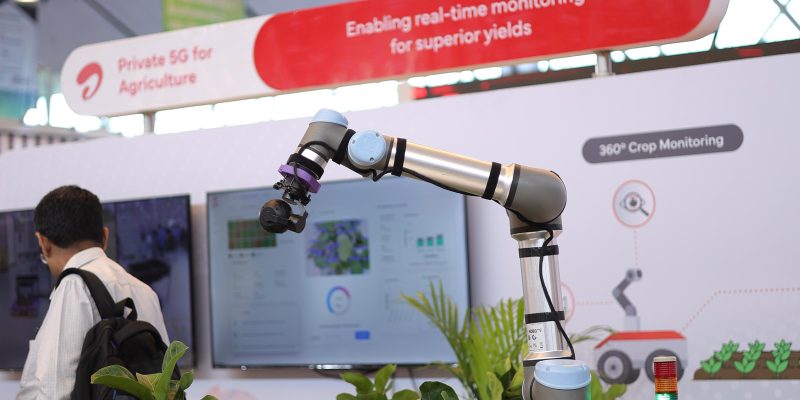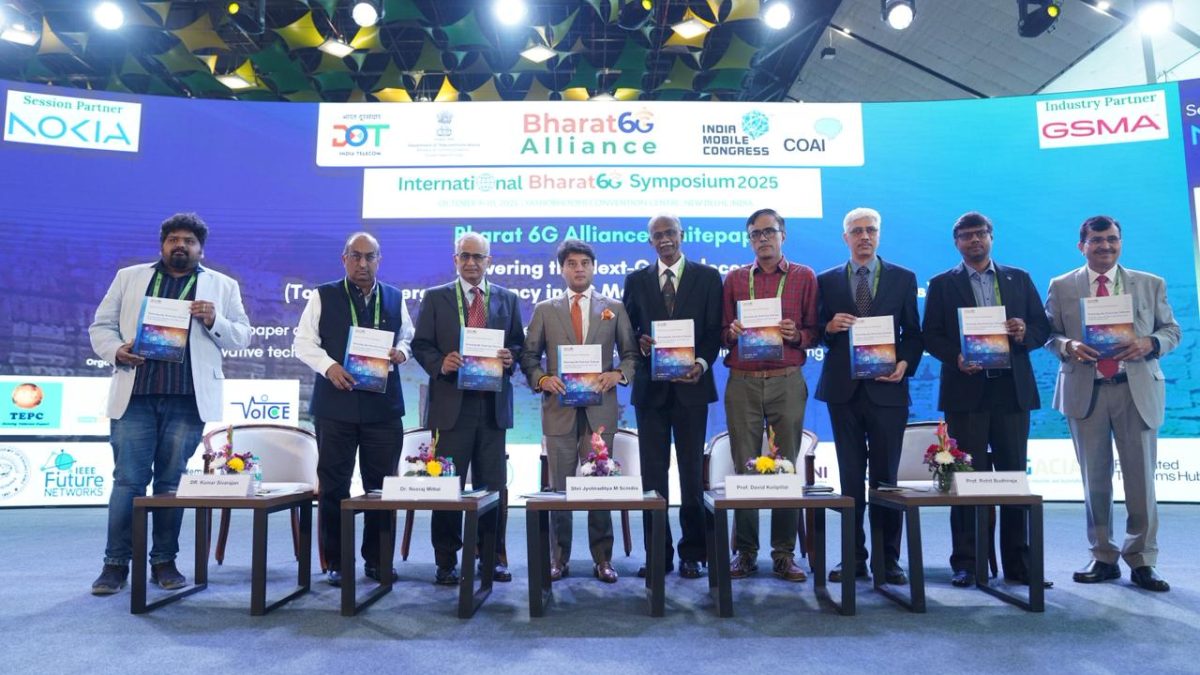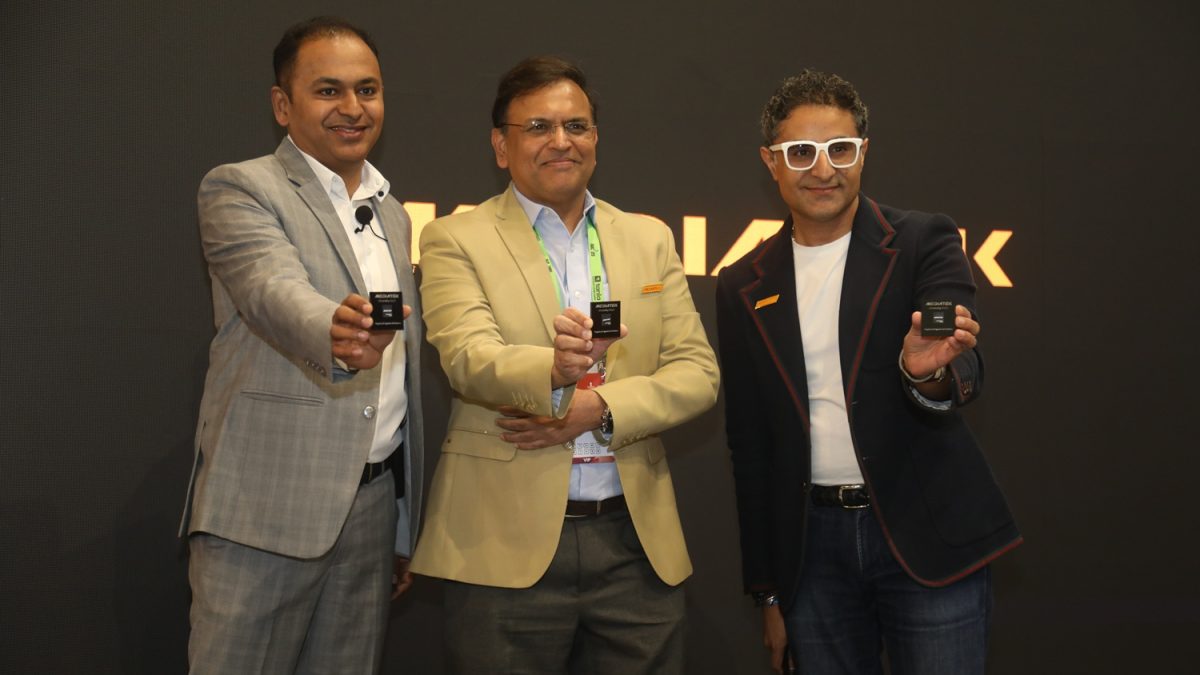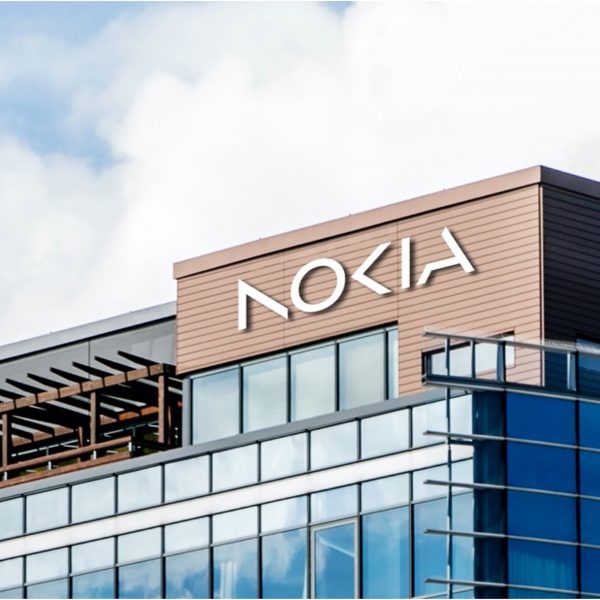IMC 2025 Day 3 advances industry dialogue on AI, data protection, cyber security and India-UK collaboration
 The 9th edition of India Mobile Congress (IMC) 2025, Asia’s largest telecom, media and technology forum, entered the third day highlighting the transformative role of artificial intelligence across sectors and India’s growing digital and telecom potential. Jointly organized by the Department of Telecommunications (DoT) and the Cellular Operators Association of India (COAI), the event, inaugurated by Hon’ble Prime Minister Narendra Modi, continues to showcase futuristic technologies and groundbreaking innovations driving the nation’s digital evolution.
The 9th edition of India Mobile Congress (IMC) 2025, Asia’s largest telecom, media and technology forum, entered the third day highlighting the transformative role of artificial intelligence across sectors and India’s growing digital and telecom potential. Jointly organized by the Department of Telecommunications (DoT) and the Cellular Operators Association of India (COAI), the event, inaugurated by Hon’ble Prime Minister Narendra Modi, continues to showcase futuristic technologies and groundbreaking innovations driving the nation’s digital evolution.
 Furthering the theme of IMC 2025, ‘Innovate to transform’, Day 3 of India Mobile Congress 2025 witnessed the inauguration of the Cybersecurity Summit, bringing together global and national leaders to deliberate on securing India’s digital future. The session on UK–India Collaboration in Future Telecoms discussed the importance of international partnerships in advancing research, innovation and next-generation connectivity between the two nations. The day also celebrated innovation and excellence with the IMC Awards 2025, recognizing groundbreaking contributions across telecom, technology and enterprise solutions. Adding to the excitement, the Startup World Cup India 2025 provided a platform for emerging startups to showcase transformative ideas and compete for global visibility.
Furthering the theme of IMC 2025, ‘Innovate to transform’, Day 3 of India Mobile Congress 2025 witnessed the inauguration of the Cybersecurity Summit, bringing together global and national leaders to deliberate on securing India’s digital future. The session on UK–India Collaboration in Future Telecoms discussed the importance of international partnerships in advancing research, innovation and next-generation connectivity between the two nations. The day also celebrated innovation and excellence with the IMC Awards 2025, recognizing groundbreaking contributions across telecom, technology and enterprise solutions. Adding to the excitement, the Startup World Cup India 2025 provided a platform for emerging startups to showcase transformative ideas and compete for global visibility.
 During the day, industry leaders participated in panel discussions on key topics including, Privacy and Protection at the Edge – Operationalising India’s Data Protection Act, Intelligent, Adaptive, Secure: The Rise of Autonomous Networks, AI in Telecom for Social and Economic Impact and Building India’s AI Workforce Advantage, AI Cyber Nexus: Securing a Future Powered by Artificial Intelligence, Enabling Access to AI Infrastructure for Inclusive Economic Growth, Building Bharat’s Future with Applied AI in Telecom.
During the day, industry leaders participated in panel discussions on key topics including, Privacy and Protection at the Edge – Operationalising India’s Data Protection Act, Intelligent, Adaptive, Secure: The Rise of Autonomous Networks, AI in Telecom for Social and Economic Impact and Building India’s AI Workforce Advantage, AI Cyber Nexus: Securing a Future Powered by Artificial Intelligence, Enabling Access to AI Infrastructure for Inclusive Economic Growth, Building Bharat’s Future with Applied AI in Telecom.
Quotes from industry leaders and policy makers on Day 3 of the India Mobile Congress 2025:
Shri Anil Kumar Lahoti, Chairman, TRAI said, “Telecom service providers are increasingly leveraging AI to optimize network operations, predict maintenance needs, combat fraud and automate complex workflows especially with the expansion of 5G and the upcoming 6G networks. One of the most important use cases of AI in telecom is operational optimisation of telecom networks. Today, telecom infrastructure supports more than 1.2 billion connections in India and billions more globally, handling enormous volumes of data traffic. AI systems analyse real-time data and historical patterns to foresee potential faults and schedule maintenance proactively. This helps prevent outages and ensures smoother service delivery. AI’s benefits also extend to security, fraud prevention, and curbing spam calls. Traditional reactive systems based on static rules are no longer sufficient in today’s fast-evolving telecom landscape.”
Shri. S. Krishnan, Secretary, MeitY said, “Given the state of play for AI globally, India is harnessing technology to become a developed nation by 2047. We are capitalising on the opportunities to work on AI infrastructure and computing capacity, in partnership with private players. We are also focussed on accessibility and inclusivity for the future. We are all geared up to have our first AI-foundational model by the end of this year. Sector-specific models of AI enhance productivity and efficiency to meet growth targets. AI will not replace people but subtract friction from the equation and India has provisions in its law to protect the interest of its people.”
Navin Kumar Singh, National Cybersecurity Coordinator, NSCS said, “India Mobile Congress has come to represent the spirit of innovation, collaboration and transformation in India’s digital journey. As we deliberate on the future of telecom and mobile technology, it is imperative that we reflect not just how far we have come but also how securely we are prepared to move forward. It is crucial to recognize that robust cybersecurity is no longer an option but essential, where even a single vulnerability can expose billions to surveillance, data theft and national security risks. As we move towards 5G and beyond, we must ensure that security and sovereignty are embedded into every layer of our telecom infrastructure. The true test of our telecom progress will not just lie in how fast our networks can run but in how safe, inclusive, and resilient they are.”
Lt. Gen. Dr. S.P. Kochhar, DG, COAI said, “The most important thing to do is protecting us from ourselves. Majority of people fall prey to scams due to lack of awareness. As a nation, we still trust digital systems and we must take steps to prevent this trust from waning off. While we are taking tech-driven measures to prevent scams, we must aim to coordinate and cooperate – when we are interoperable and can work cross boundaries – only then will we create an ecosystem with an iron wall which scamsters will not be able to penetrate. Having standards is also a must; interoperability without standards doesn’t mean much. If we address these three simultaneously, enhance user awareness, use technology responsibly and look into the regulatory part, we will be able to build a strong shield against scamsters.”
Julian Gorman, Head of Asia Pacific, GSMA said, “Across Asia, scams have become a borderless challenge, eroding consumer trust and undermining digital inclusion. The key lies in collaboration, as connecting network data with scam behavior and exposing anonymized risk signals through APIs can empower banks, platforms, and governments to detect threats earlier and protect users more effectively. Regulatory flexibility and data-sharing sandboxes will be crucial to achieving this. It is equally important to share success stories and best practices across markets so that positive outcomes can inspire broader adoption. Ultimately, strengthening digital trust is not just about stopping scams, it is about enabling safer connectivity and ensuring that more people feel confident to participate in the digital economy.”
Magnus Ewerbring, CTO, APAC, Ericsson said “Managing mobile networks is a very large task with many nodes, interfaces and points to guard to ensure the right cyber protection. We take this responsibility seriously to make sure our products and networks are safe and secure. We focus on three major areas – how we develop, deploy, and operate networks; how we identify and respond to incidents; and how we drive our research. AI increasingly plays a role in all these areas from qualifying suppliers and securing network implementations to detecting anomalies in real-life operations. We are looking ahead and actively contributing to standardization efforts to ensure that future technologies like AI can be securely deployed. AI will continue to be an integral foundation in how we develop, deploy and operate networks in the years to come.”
Dr. Amitava Ghosh, NextG Alliance, USA said, “Our intention is global collaboration and we are interested in all aspects of 6G. We have made significant contributions to ITU-R with regards to 6G 2030 requirements. We are also focusing on a consortium where the industry, academia and government work together. We need specific goals on the Bharat 6G alliance to ensure optimal collaboration and we are keen on global cooperation on selective verticals which are common to India and North America.”
Rahul Vatts, Chief Regulatory Officer, Airtel said, “We are really enthusiastic about how the entire API framework is developing in India. When we tried to do some of the APIs, we recognized some patterns – like SIM swap, device swap, and OTP manipulation. Most of the operators in India have started implementing those APIs. I think two large operators have already onboarded, and we are ready and, in fact, creating proof of concept with some of the banks right now.”
Ambika Khurana, CRO, Vodafone India said, “With India’s increasing scale and digital adoption, the concern around scams is also getting bigger. We are working with TRAI on an interesting pilot and collaborating with RBI and Indian banks to build a robust framework which will foolproof and secure all privacy requirements, and streamline consent so that users are empowered in their digital journey. We all need to work collectively to combat the issue (of frauds and scams) at hand.”
Vivek Srivastava, Country Manager, Fortinet said, “We are at a pivotal moment of India’s digital transformation when telecom and technology are driving innovation, inclusion and growth. The cyber resilience that we build today must become the foundational piece of our digitalization journey going forward. Security needs collaboration, public and private institutions and many other participants have to come together to play it as a team sport. I think India’s opportunity is in convergence. We need to adopt more platform-centric service security solutions in the ecosystem and ensure that accelerated digital transformation remains secured.”
Organized by the Department of Telecommunications (DoT) and the Cellular Operators Association of India (COAI), IMC 2025 is being held from 8th to 11th October 2025 in New Delhi. The event is expected to attract over 1.5 lac visitors from 150+ countries, feature over 400 exhibitors & partners and more than 7,000 global delegates. The flagship startup program, ASPIRE, introduced in 2023, will feature over 500 startups and connect them with more than 300 investors, incubators accelerators and VCs for mentorship, live pitching sessions and networking. IMC, Asia’s largest digital technology forum will also witness 800 plus speakers participating over 100 conference sessions.







